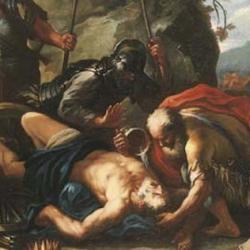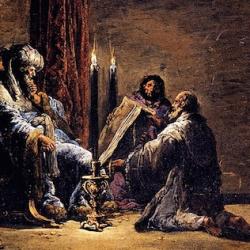The Hebrew word ma’al is a key term in Chronicles. It means “act of unfaithfulness” or “sacrilege,” and is the sin that leads to Saul’s fall (he ma’aled a ma’al, 1 Chronicles 10:13) and to the exile of Judah, whose officials and priests ma’aled a ma’al (2 Chronicles 36:14).
David doesn’t commit a ma’al. Instead, his kingdom is “highly exalted” in the eyes of Gentile rulers like Hiram (1 Chronicles 14:2). “High exalted,” though, translates the Hebrew lema’lah, which contains the same consonants as ma’al/sacrilege. The term for “highly exalted” is from the verb ‘alah, “to ascend or go up,” the root of the word for “ascension offering” (burnt offering) and a commonly used term for social, spiritual, or physical ascent.
As the word for “sacrilege” becomes a leitmotif in the brief account of Saul’s reign and for the reign’s of other unfaithful kings, so the punning term for “exalt” recurs throughout the Chronicler’s account of the reigns of David and Solomon. David says that the temple will be “highly exalted” (1 Chronicles 22:5), his contributions to the temple are elevated (1 Chronicles 29:3), and Solomon himself is highly exalted (2 Chronicles 1:1). Other faithful kings are also lifted up (Jehoshaphat, 2 Chronicles 17:12; Uzziah, 2 Chronicles 26:8).
The choice before Israel’s kings is between ma’al and ma’alah, between sacrilege and exaltation. Unfaithfulness brings kings down; faithfulness lifts them up on high.















